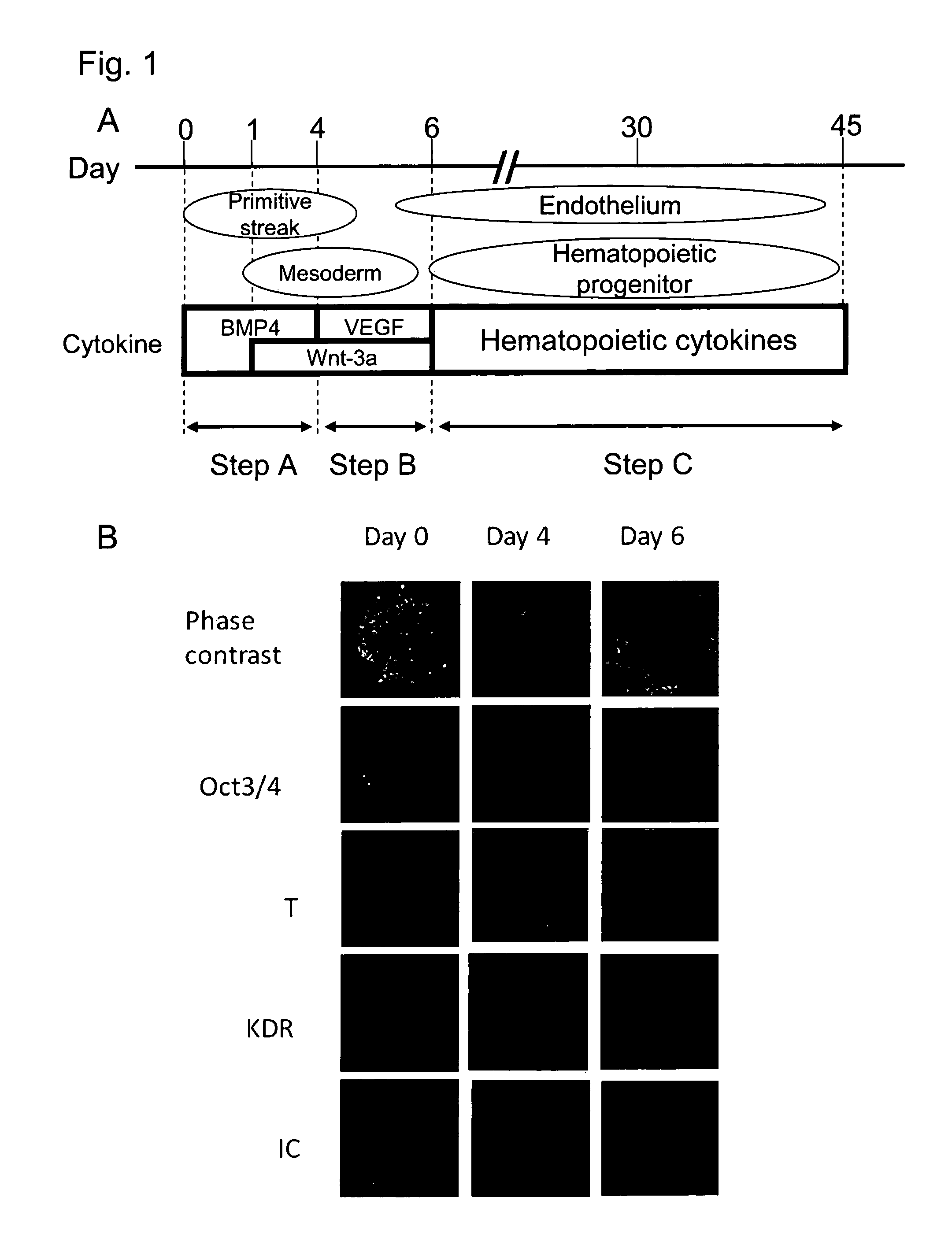Method for producing mesodermal cells by culturing under adherent conditions and without co-culture with cells from a different species in a serum-free medium
a mesodermal cell and adherent medium technology, applied in cell culture active agents, tumor/cancer cells, embryonic cells, etc., can solve the problems of no report on mesoderm, hematopoietic stems, etc., and achieve the effect of efficient production of mesoderm
- Summary
- Abstract
- Description
- Claims
- Application Information
AI Technical Summary
Benefits of technology
Problems solved by technology
Method used
Image
Examples
example 1
Differentiation Induction into Mesoderm Containing Hematopoietic Stem Cells and / or Hematopoietic Progenitor Cells
[0098]By the schemes of Step A and Step B described in FIG. 1A, mesoderm containing hematopoietic stem cells and / or hematopoietic progenitor cells was prepared. Briefly, KhES-3 which had been maintained in an undifferentiated state was cultured for 1 day in a Growth factor-reduced Matrigel (BD Biosciences)-coated dish containing a culture medium prepared by adding ITS-X (Gibco) to Stemline II (S0192, Sigma) and further adding 20 ng / ml BMP4 thereto. This was followed by culturing for additional 3 days in the medium to which 10 ng / ml Wnt3a was further added. Subsequently, the medium was replaced with a medium prepared by adding ITS-X to Stemline II and further adding 10 ng / ml Wnt3a and 10 ng / ml VEGF thereto, and the cells were then cultured for 2 days. Gene expression was analyzed in the obtained cells and as a result, expression of mesodermal markers T and KDR and an embry...
example 2
Differentiation Induction into Mesoderm Containing Hematopoietic Stem Cells and / or Hematopoietic Progenitor Cells
[0110]KhES-1 or KhES-3, which had been maintained in an undifferentiated state for 2 days in a Growth factor-reduced Matrigel-coated dish, was cultured at 5% O2 condition for 4 days in a culture medium prepared by adding ITS-X to Stemline II and further adding 20 ng / ml BMP4 thereto. After that, the culture medium was changed to Stemline II with the addition of ITS-X, 40 ng / ml VEGF and 50 ng / ml SCF, and these cells were cultured for 2 days at 5% O2 condition. Then, KDR and CD34 positive cells were confirmed by flow cytometry analysis (FIG. 14). Thus, it was confirmed that, by using the present method of differentiation induction, mesoderm containing hematopoietic stem cells and / or hematopoietic progenitor cells can be induced.
Differentiation Induction into Neutrophil
[0111]The mesoderm cells obtained by the above method were subjected to differentiation induction using Stem...
PUM
| Property | Measurement | Unit |
|---|---|---|
| concentration | aaaaa | aaaaa |
| concentration | aaaaa | aaaaa |
| concentration | aaaaa | aaaaa |
Abstract
Description
Claims
Application Information
 Login to View More
Login to View More - R&D
- Intellectual Property
- Life Sciences
- Materials
- Tech Scout
- Unparalleled Data Quality
- Higher Quality Content
- 60% Fewer Hallucinations
Browse by: Latest US Patents, China's latest patents, Technical Efficacy Thesaurus, Application Domain, Technology Topic, Popular Technical Reports.
© 2025 PatSnap. All rights reserved.Legal|Privacy policy|Modern Slavery Act Transparency Statement|Sitemap|About US| Contact US: help@patsnap.com



